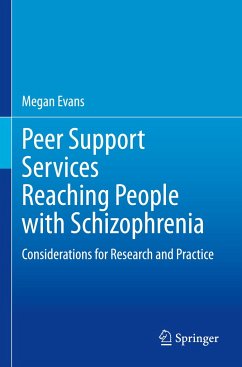Many mental health providers are seeking guidance in designing and improving peer support programs for people with mental illnesses. However, the evidence base in this area is limited by lack of consensus on the core components of peer support. This research provides a comprehensive, nuanced view of peer support reaching people with schizophrenia. Results of a realist review of 355 sources and interviews with experts in the field are presented. Realist review is an approach to evidence synthesis that asks, 'What works, for whom, and in what circumstances?' Results include a typology of key functions of peer support (e.g., being there, linkage to clinical care and community resources, systems advocacy, ongoing support), documented benefits (e.g., decreased acute care utilization, increased recovery), and implementation recommendations (e.g., critical mass of peer workers, supportive infrastructure, an organizational recovery orientation). The book is intended for program planners,managers, and researchers.








